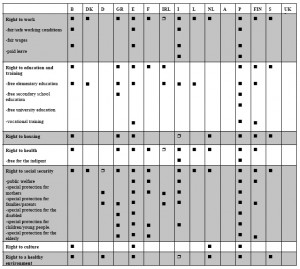Attention anybody who is screaming, struggling, protesting … being forced to revolt against an unjust and uncaring ‘system’ … so that Vulnerable Individuals and Groups … older people, children, people with disabilities, the homeless, etc., etc., etc … will be treated with dignity, equality and respect in our society … Ireland and the European Union. Pinch yourselves … we are Irish and Europeans !
It is helpful, as an introduction, if a distinction is made between human rights and social rights …
Social Rights: Rights to which an individual person is legally entitled, e.g. the right to free elementary education [Art.26(1), 1948 Universal Declaration of Human Rights], but which are only exercised in a social context with other people, and with the active support of a competent legal authority, e.g. a Nation State.
Commentary: In contrast to Human Rights, it is not protection from the State which is desired or achieved, but freedom with the State’s help.
Social Rights, as distinguished here, include and extend beyond current understandings of civil, political, economic, social and cultural rights.
.
Early in the year 2000 … the European Parliament issued a Working Paper (reference PE 168.629) with the title: ‘Fundamental Social Rights in Europe’. The authors were Mark Eric Butt, Julia Kübert and Christiane Anne Schultz. The manuscript was completed in November 1999.
Without getting into the fine detail of the Working Paper … the following Table, on Page 31, is very enlightening …

In the Working Paper, the Table is explained …
‘ The following Table is an overview of the contents of the Member States’ constitutions. It shows what fundamental social rights are enshrined in the constitutions. It is impossible, however, to forge a link between the existence of fundamental social rights and the existence and level of social benefits and institutions in the Member States concerned. This is clear, primarily, from Austria and Great Britain, their columns being empty – whereas they do, of course, have social rights.
The symbol … simple black box … in the table means that the right concerned is referred to in the constitution. The other symbol … shadowed white box … means that, though not explicitly enshrined in the constitution, it is recognised.’
The Countries are listed in the order … Belgium (B), Denmark (DK), Germany (D), Greece (GR), Spain (E), France (F), Ireland (IRL), Italy (I), Luxembourg (L), The Netherlands (NL), Austria (A), Portugal (P), Finland (FIN), Sweden (S) and Great Britain (UK).
.
Now … compare and contrast … paying particular attention to Ireland …
Interesting … isn’t it ?
.
.
END
